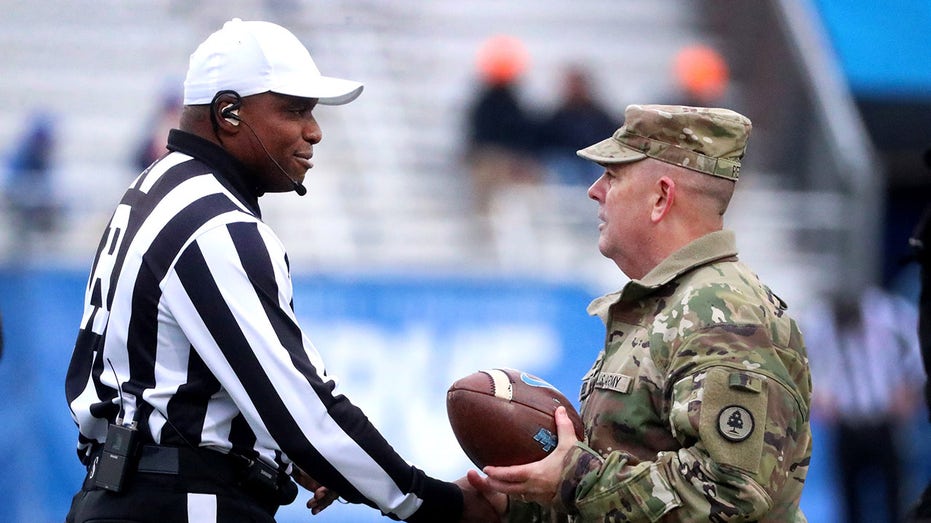‘Hell no’: Endangered Senate Dems chafe at relentless GOP drive to tie them to Biden
Jon Tester recently became the first Democratic senator to sign onto a stringent GOP immigration bill. He isn’t happy that Republicans are accusing him of a late-stage transformation into a border hawk. “They’re full of shit. And whoever told you that, you can say ‘Jon Tester said you’re full of shit,’” the Montana Democrat said in an interview, responding to GOP claims that his support for the Laken Riley Act — named for the nursing student killed earlier this year by an undocumented immigrant — was an act of political expediency. “I firmly believe in my heart of hearts that if you're here and you’re undocumented … and you break the law, you should be shipped back,” Tester added. He indicated in March he’d support the legislation as a standalone bill. Republicans counter that Tester joined other Democrats to rule out the addition of new immigration restrictions to a must-pass spending bill. Meanwhile, the GOP is running millions of dollars in ads hitting him for “supporting Biden’s border disaster.” The episode underscores the core challenge facing this year’s Senate Democratic hopefuls in red and purple states: They must carve out distance from President Joe Biden to keep running ahead of his numbers — while dodging political hits that they’re shifting gears purely to win reelection. Because Biden is no sure bet in November and may offer Democrats little coattails to ride, Senate hopefuls across the country are hoping to defuse a sustained GOP campaign linking them to Biden. And with little must-pass business scheduled the rest of the year and a divided Congress, Democrats will have plenty of opportunities to emphasize strategic differences with their party’s leader. Sen. Sherrod Brown (D-Ohio) is pushing Biden to beef up tariffs against China and ban Chinese electric vehicles. Sen. Jacky Rosen (D-Nev.) is challenging Biden’s Israel weapons policy and opposing a key judicial nominee. Rep. Elissa Slotkin (D-Mich.), a Senate candidate, is urging Biden to take tougher border action. Sen. Tammy Baldwin (D-Wis.) helped pause a global trade deal. Sen. Bob Casey (D-Pa.) wants Biden to reconsider an LNG export pause while harmonizing with Brown on tariffs and Rosen on Israel. And Rep. Colin Allred (D-Texas), a Senate candidate, just launched an ad saying he “stood up to the president when he was wrong.” Then there’s Tester, whose state Biden lost by 16 points in 2020. Tester didn’t play up his beefs with the administration too much the first two years of Biden’s presidency — though he certainly had some on Covid policy and the Keystone XL pipeline — but he’s fighting Biden’s regulations on multiple fronts these days and working to burnish a tough image on immigration. He chastised Homeland Security Secretary Alejandro Mayorkas to “step up” last month — though Tester did not support Mayorkas’ impeachment. He says voters shouldn’t judge him on a procedural vote with a funding lapse hanging over lawmakers’ heads: “That was a government shutdown vote, it wasn’t a Laken Riley vote.” Sen. Steve Daines (R-Mont.), the GOP’s campaign arm chief, responded: “Where was he when we needed him, when the vote really counted? … [T]he politics back home have changed, and Tester’s changed his position.” Sen. J.D. Vance (R-Ohio), who occasionally works closely with Brown but supports his GOP opponent, is more measured than Daines when talking about his home-state colleague: “Do I doubt Sherrod’s sincerity? No. But I think the big mistake that Sherrod has made on manufacturing policy is he got way too pregnant on the green energy stuff.” Brown responded that the nation “should ban electric vehicles from China. So, the tariffs help, and [Biden’s] made them better, but we should do more.” “I’m not going to get into a political debate with the guy who has already endorsed my opponent,” Brown said of Vance’s comments. “I’ve taken on presidents in both parties.” The pro-tariff stance he and other vulnerable colleagues have taken also aligns with former President Donald Trump’s — not bad for their crossover appeal. Casey said “a lot of people back home expect that type of aggressive action, especially with predatory China.” And in Nevada, where Biden is struggling against Trump, Rosen has split with Biden on everything from environmental and mining regulations to solar tariffs. She said in a statement she hasn’t “been afraid to break with my own party to do what is right for my state.” Creating distance from an embattled president is not a new tactic, but it’s always harder in years when the White House is on the ballot. Plus, most of the Senate GOP’s candidates are political novices with no voting record to create a clear contrast. Democratic incumbents, on the other hand, spent two years in a 50-50 majority where unity was paramount, leaving them with lots of votes supporting Biden’s position. “The president is grateful that their common values mean they are overwhelmingly united on the same agenda based on standing up

Jon Tester recently became the first Democratic senator to sign onto a stringent GOP immigration bill. He isn’t happy that Republicans are accusing him of a late-stage transformation into a border hawk.
“They’re full of shit. And whoever told you that, you can say ‘Jon Tester said you’re full of shit,’” the Montana Democrat said in an interview, responding to GOP claims that his support for the Laken Riley Act — named for the nursing student killed earlier this year by an undocumented immigrant — was an act of political expediency.
“I firmly believe in my heart of hearts that if you're here and you’re undocumented … and you break the law, you should be shipped back,” Tester added. He indicated in March he’d support the legislation as a standalone bill.
Republicans counter that Tester joined other Democrats to rule out the addition of new immigration restrictions to a must-pass spending bill. Meanwhile, the GOP is running millions of dollars in ads hitting him for “supporting Biden’s border disaster.”
The episode underscores the core challenge facing this year’s Senate Democratic hopefuls in red and purple states: They must carve out distance from President Joe Biden to keep running ahead of his numbers — while dodging political hits that they’re shifting gears purely to win reelection.
Because Biden is no sure bet in November and may offer Democrats little coattails to ride, Senate hopefuls across the country are hoping to defuse a sustained GOP campaign linking them to Biden. And with little must-pass business scheduled the rest of the year and a divided Congress, Democrats will have plenty of opportunities to emphasize strategic differences with their party’s leader.
Sen. Sherrod Brown (D-Ohio) is pushing Biden to beef up tariffs against China and ban Chinese electric vehicles. Sen. Jacky Rosen (D-Nev.) is challenging Biden’s Israel weapons policy and opposing a key judicial nominee. Rep. Elissa Slotkin (D-Mich.), a Senate candidate, is urging Biden to take tougher border action. Sen. Tammy Baldwin (D-Wis.) helped pause a global trade deal.
Sen. Bob Casey (D-Pa.) wants Biden to reconsider an LNG export pause while harmonizing with Brown on tariffs and Rosen on Israel. And Rep. Colin Allred (D-Texas), a Senate candidate, just launched an ad saying he “stood up to the president when he was wrong.”
Then there’s Tester, whose state Biden lost by 16 points in 2020. Tester didn’t play up his beefs with the administration too much the first two years of Biden’s presidency — though he certainly had some on Covid policy and the Keystone XL pipeline — but he’s fighting Biden’s regulations on multiple fronts these days and working to burnish a tough image on immigration.
He chastised Homeland Security Secretary Alejandro Mayorkas to “step up” last month — though Tester did not support Mayorkas’ impeachment. He says voters shouldn’t judge him on a procedural vote with a funding lapse hanging over lawmakers’ heads: “That was a government shutdown vote, it wasn’t a Laken Riley vote.”
Sen. Steve Daines (R-Mont.), the GOP’s campaign arm chief, responded: “Where was he when we needed him, when the vote really counted? … [T]he politics back home have changed, and Tester’s changed his position.”
Sen. J.D. Vance (R-Ohio), who occasionally works closely with Brown but supports his GOP opponent, is more measured than Daines when talking about his home-state colleague: “Do I doubt Sherrod’s sincerity? No. But I think the big mistake that Sherrod has made on manufacturing policy is he got way too pregnant on the green energy stuff.”
Brown responded that the nation “should ban electric vehicles from China. So, the tariffs help, and [Biden’s] made them better, but we should do more.”
“I’m not going to get into a political debate with the guy who has already endorsed my opponent,” Brown said of Vance’s comments. “I’ve taken on presidents in both parties.”
The pro-tariff stance he and other vulnerable colleagues have taken also aligns with former President Donald Trump’s — not bad for their crossover appeal. Casey said “a lot of people back home expect that type of aggressive action, especially with predatory China.”
And in Nevada, where Biden is struggling against Trump, Rosen has split with Biden on everything from environmental and mining regulations to solar tariffs. She said in a statement she hasn’t “been afraid to break with my own party to do what is right for my state.”
Creating distance from an embattled president is not a new tactic, but it’s always harder in years when the White House is on the ballot. Plus, most of the Senate GOP’s candidates are political novices with no voting record to create a clear contrast. Democratic incumbents, on the other hand, spent two years in a 50-50 majority where unity was paramount, leaving them with lots of votes supporting Biden’s position.
“The president is grateful that their common values mean they are overwhelmingly united on the same agenda based on standing up for the middle class and our freedoms, and respects when his colleagues have different views from his own,” White House spokesperson Andrew Bates said of Democratic dissent.
Most of those lawmakers see little upside in totally running away from the president anyway, due to the strong correlation between voters’ presidential and Senate choices. Brown, for example, hasn’t decided on joining Tester in backing the Laken Riley Act, which would detain and remove undocumented immigrants arrested for theft-related offenses.
Senate Judiciary Chair Dick Durbin (D-Ill.) summed up the meaning of Tester’s move: “He’s more conservative on some issues than I am. And I respect it.”
“In tough states, it’s not unusual for the candidates to split from the president’s party — both sides of the aisle,” Durbin said.



